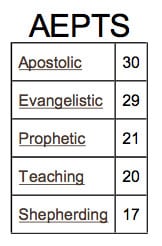[featured_image]I first completed the APEST Assessment about three years ago. If you aren’t familiar with this acronym, it is based on Ephesians 4:11.
Here’s how the APEST Assessment is described at theforgottenways.org/apest:
The APEST Assessment is a profiling instrument designed to assist you in finding your ministry style in relation to the philosophy of the fivefold ministry of Ephesians 4 (Apostles, Prophets, Evangelists, Shepherds, Teachers). It has emerged from 10 years of practical application of this model in various ministry contexts. PUT ANOTHER WAY… APEST is an online, formative, self-assessment is designed to solicit an individual response to a series of questions. APEST is a subjective assessment, offering questions that may solicit more than one applicable answer. APEST measures an individual’s current ministry motivation and expression in ministry settings. As a result, APEST leads one to new areas of learning and integration for increased ministry engagement. APEST provides a quantified result to identify one’s current place for influence within a larger community.
ministry of Ephesians 4 (Apostles, Prophets, Evangelists, Shepherds, Teachers). It has emerged from 10 years of practical application of this model in various ministry contexts. PUT ANOTHER WAY… APEST is an online, formative, self-assessment is designed to solicit an individual response to a series of questions. APEST is a subjective assessment, offering questions that may solicit more than one applicable answer. APEST measures an individual’s current ministry motivation and expression in ministry settings. As a result, APEST leads one to new areas of learning and integration for increased ministry engagement. APEST provides a quantified result to identify one’s current place for influence within a larger community.
Ministry vocation is a mixture of personal identity, God’s calling, the Spirit’s gifting, and community discernment. We only really know ourselves and our ministry impact in relation to others. So we believe that the best way to know your ministry is to somehow assess its impact on people around about you. So while you can easily do the individual profile, we really recommend that you consider doing the 360 degree test as well. This is a great tool for communities and leadership teams as a whole as it will allow you to ensure that you have a more complete ministry mix necessary to be missional church.
The APEST material originated in the writings of Paul. For there to be movement or growth in any context, a team should draw upon the natural energy and momentum inherent in each member. Every person functions in unique ways. It is remarkable when a group allows each member to function out of their natural capacities, thus contributing to the overall movement, direction, and wisdom of a team. APEST™ is designed to help people identify their natural, ministry motivation and expression in a given situation.
My Profile is Apostolic + Evangelist. Here are my results:
The Apostle Evangelist’s impact on others comes through their expansive view of the Gospel message and it’s application individually and corporately. This is one of the tasks driven of the ministry styles. The AE has a great sense of urgency and sense of knowing what they must do. The AE seeks out committed individuals and recruits them into the movement. As a big risk-taker and innovator, the AE engages people by inspiring them to take relative risks for the cause. The ultimate motivation of the Apostle Evangelist is for individual commitments to spread the Kingdom of God.
I was taught growing up that apostles and prophets were no longer needed today. After the church was established and the NT was written, these roles ceased to exist. However, while I’m certain there isn’t a position in the church of Apostle or Prophet, I do believe that these functions are extremely important.
It would be helpful for church planters to understand their unique contribution based on these five functions (Apostle, Prophet, Evangelist, Shepherd, and Teacher), as well as assessing their launch team members. All five functions are necessary to plant a healthy church. If any of these functions are missing, it could negatively affect the design and development of a new church.
I highly recommend that church planters evaluate what contribution each of their team members will make based on these five functions. It may also be helpful to use the online assessment at theforgottenways.org/apest.
Today’s Missional Challenge
Use the APEST Assessment to discern how you can best contribute to the mission of Jesus. Do your part!

